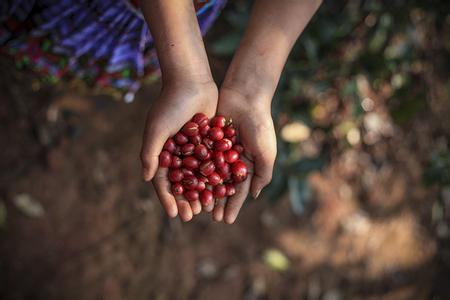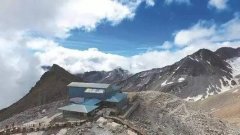A brief introduction to the treatment method of grinding degree and baking degree of Columbia exquisite coffee beans with high balance

Colombia's exquisite Tamina boutique raw beans
The suitable climate in Colombia provides a real "natural pasture" for coffee. Coffee trees in Colombia are mainly cultivated in the Andes, on steep slopes about 1300 meters above sea level, where the annual temperature is about 18 degrees Celsius, annual rainfall is 2000 to 3000 millimeters, latitude 1 °- 11 °15 north, longitude 72 °- 78 °west, the specific range of elevation is more than 2.000 meters. A special combination of factors, latitude, altitude, soil, plant origin of species and varieties of coffee production in Colombia's coffee growing area, rain patterns produced by the climate of the coffee growing area and tropical convergence, changing topography, luminosity, favorable temperature range throughout the year, moderation and Rain Water's distribution And include some common cultural practice areas in the process of selective logging and transformation, including washing and drying. Very suitable for the growth of coffee, mild climate, humid air, and can be harvested regardless of season.
No matter in terms of yield or texture, Colombian coffee is first produced by Medellin, which is characterized by full granules, rich nutrition, moderate acidity, good balance, rich aroma and soft taste. In addition to Medellin, the capitals of two neighboring southern provinces, Armenia and Manizales, are also famous coffee producers, which formerly belonged to Medellin's province of Andiquio, which has a Caldas football team that played in the last Toyota Cup. These three places have formed the world-famous "coffee zone".
Usually, after continuous drying followed by a rain, the coffee tree will usher in the flowering season. After the first precipitation in Nalinglong, September, the coffee flowering season will be ushered in. Accordingly, the harvest season will begin in April of the following year and will gradually enter the high-altitude producing areas. The harvest season may last until August.
The annual temperature there is about 18 degrees Celsius, the annual rainfall is 2000 to 3000 mm, latitude 1 °- 11 °15 north, longitude 72 °- 78 °west, and the specific range of elevation can exceed 2.000 meters. A special combination of factors, latitude, altitude, soil, plant origin of species and varieties of coffee production in Colombia's coffee growing area, rain patterns produced by the climate of the coffee growing area and tropical convergence, changing topography, luminosity, favorable temperature range throughout the year, moderation and Rain Water's distribution And include some common cultural practice areas in the process of selective logging and transformation, including washing and drying. It is very suitable for the growth of coffee, mild climate, humid air, and can be harvested regardless of season, regardless of yield or texture. Colombian coffee is first produced by Medellin, which is characterized by full granulated coffee beans, rich nutrition, moderate acidity, good balance, rich aroma and soft taste. In addition to Medellin, the capitals of two neighboring southern provinces, Armenia and Manizales, are also famous coffee producers, which formerly belonged to Medellin's province of Andiquio, which has a Caldas football team that played in the last Toyota Cup. These three places have formed the world-famous "coffee zone".
The suitable climate in Colombia provides a real "natural pasture" for coffee. Coffee trees in Colombia are mainly cultivated in the Andes, on steep slopes about 1300 meters above sea level, where the annual temperature is about 18 degrees Celsius, annual rainfall is 2000 to 3000 millimeters, latitude 1 °- 11 °15 north, longitude 72 °- 78 °west, the specific range of elevation is more than 2.000 meters. A special combination of factors, latitude, altitude, soil, plant origin of species and varieties of coffee production in Colombia's coffee growing area, rain patterns produced by the climate of the coffee growing area and tropical convergence, changing topography, luminosity, favorable temperature range throughout the year, moderation and Rain Water's distribution And include some common cultural practice areas in the process of selective logging and transformation, including washing and drying. Very suitable for the growth of coffee, mild climate, humid air, and can be harvested regardless of season
The annual rainfall is 2000 to 3000 mm, latitude 1 °- 11 °15 north, longitude 72 °- 78 °west, and the specific range of elevation can exceed 2.000 meters. A special combination of factors, latitude, altitude, soil, plant origin of species and varieties of coffee production in Colombia's coffee growing area, rain patterns produced by the climate of the coffee growing area and tropical convergence, changing topography, luminosity, favorable temperature range throughout the year, moderation and Rain Water's distribution And include some common cultural practice areas in the process of selective logging and transformation, including washing and drying. Very suitable for the growth of coffee, mild climate, humid air, and can be harvested regardless of season
No matter in terms of yield or texture, Colombian coffee is first produced by Medellin, which is characterized by full granules, rich nutrition, moderate acidity, good balance, rich aroma and soft taste. In addition to Medellin, the capitals of two neighboring southern provinces, Armenia and Manizales, are also famous coffee producers, which formerly belonged to Medellin's province of Andiquio, which has a Caldas football team that played in the last Toyota Cup. These three places form the world-famous "coffee zone". Colombian coffee is divided into more than 200 grades, the regional coffee is very strong. Columbia beans take the SUPERMO as the highest grade, followed by the EXCELSO, but only selected coffee of more than 18 beans (18cm 64 inches in diameter) can be included in the selection. Colombian coffee has a balanced flavor and a smooth taste, just like a gentleman in coffee. It has a wide range of producing areas, but the coffee in the central mountain area is the best and has a thick texture. The most famous producing areas are medellin, armenia and manizales, which are commonly referred to as "mam". Yes, "Na Linglong Coffee" (narino) is delicious and of good quality. It is said that starbucks, which specializes in specialty coffee, has the exclusive right to buy narino supermo coffee beans, which are common in their chain stores.
Origin: na Linglong
Altitude: 1860 m-2220 m
Processing method: washing
Harvest time: April-June (75%), October-February (25%)
Variety: new Kaddura species, Castie
Baking degree: CITY+
Taste features: roasted almonds, lemon and orange, white chocolate, honey, peach, round body, long finish, balanced
This is why Colombian coffee is of high quality. Colombia has three Codiera mountains running north and south, right into the Andes. Coffee is grown along the highlands of these mountains. The mountain steps provide a diverse climate, where the whole year is the harvest season, and different kinds of coffee ripen at different times. And fortunately, unlike Brazil, Colombia doesn't have to worry about frost. About 2.7 billion coffee trees have been documented in Colombia, 66 per cent of which are planted in modern plantations, while the rest are planted in traditional small farms with the pure taste of Colombian coffee. It comes from Colombia's natural environment with the most favorable conditions for coffee growth. But beyond that, it is inseparable from the hard work of local growers. In Colombia, coffee cultivation has reached 1.07 million hectares, there are about 302000 coffee plantations in the country, and 30 to 40 per cent of the rural population depends directly on coffee production. Although there are many farms in Colombia, they are not large in area. The area of each farm is only about 2 hectares, and more than 80% of the coffee plantations have only about 5000 coffee trees, an average of 3000. Thus it can be seen that agriculture in Colombia belongs to the small-scale farm type. The locals plant tall trees or banana trees around the coffee trees. Build an Arbor for coffee trees at the seedling stage to ensure the cool and humid environment needed for coffee growth. Due to the high humidity, small temperature difference and slow ripening of coffee beans in the coffee forest, which is conducive to the accumulation of caffeine and aromatic substances, the quality of coffee is the best.
The two main varieties of Colombian coffee are Kaddura and Colombian. Kaddura currently accounts for 45-50% of Colombian production; the Colombian species is a new breed developed in Colombia in the 1980s and has the pedigree of Kaddura and Timo. At present, the coffee variety ratio in Colombia is roughly 50% in Kaddura, 30% in Colombia and 20% in Tibica.
Colombia's FNC (National Organization of Coffee producers) places Specialty Coffee in a more stringent position than national standards. Specialty Coffee is divided into: 1. Origin 2. PREPARETION; three classifications of 3.SUSTAINABLE.
ORIGIN is subdivided into the following three categories.
1. ESTATE: a single farm with an annual output of more than 500bags. (rare in quantity)
2. EXOTIC: it has very precious features. (Labateca region, which belongs to the EXOTIC level)
3. Specific producing areas of REGIONAL:Narino, Huila, etc.
Important Notice :
前街咖啡 FrontStreet Coffee has moved to new addredd:
FrontStreet Coffee Address: 315,Donghua East Road,GuangZhou
Tel:020 38364473
- Prev

Columbia with a long aftertaste, the cultivation of exquisite boutique coffee beans, geographical location, climate and altitude
No matter in terms of yield or texture, Colombian coffee is first produced by Medellin, which is characterized by full granules, rich nutrition, moderate acidity, good balance, rich aroma and soft taste. In addition to Medellin, the provincial capitals of two neighboring provinces in the south, Armenia and Manizales, are also famous coffee producers.
- Next

Mellow Yunnan small Coffee Huaguoshan boutique Coffee Bean Flavor and Taste description Jane
Pu'er, Xishuangbanna, Wenshan, Baoshan, Dehong, Lincang and other places in the south and west of Yunnan are all the distribution areas of small-grain coffee in Yunnan. As of January 1, 2012, according to the comprehensive survey of Yunnan Province, the planting area of coffee in Yunnan has exceeded 800000 mu, and the output of coffee beans in this period is expected to exceed 55000 tons. For the future, the blueprints of local governments in Yunnan have also been drawn up:
Related
- Detailed explanation of Jadeite planting Land in Panamanian Jadeite Manor introduction to the grading system of Jadeite competitive bidding, Red bid, Green bid and Rose Summer
- Story of Coffee planting in Brenka region of Costa Rica Stonehenge Manor anaerobic heavy honey treatment of flavor mouth
- What's on the barrel of Blue Mountain Coffee beans?
- Can American coffee also pull flowers? How to use hot American style to pull out a good-looking pattern?
- Can you make a cold extract with coffee beans? What is the right proportion for cold-extracted coffee formula?
- Indonesian PWN Gold Mandrine Coffee Origin Features Flavor How to Chong? Mandolin coffee is American.
- A brief introduction to the flavor characteristics of Brazilian yellow bourbon coffee beans
- What is the effect of different water quality on the flavor of cold-extracted coffee? What kind of water is best for brewing coffee?
- Why do you think of Rose Summer whenever you mention Panamanian coffee?
- Introduction to the characteristics of authentic blue mountain coffee bean producing areas? What is the CIB Coffee Authority in Jamaica?

